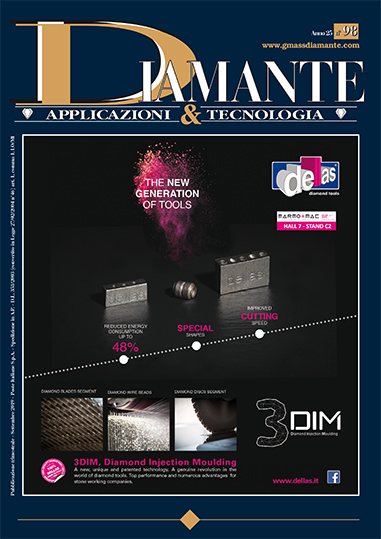|
Diamante A&T Contents Year XXV - September 2019 |
|||||
|
Front Cover: DELLAS S.p.A An example of leading-edge excellence in the stone cutting sector since 1973, in 40 years of activity, Dellas Spa has reached a leading position in the international market of the production and sale of diamond tools for marble, granite and engineered stone. In the Spotlight 10) Virto-Cuccolini: sphericity of metal powders cause blocking of the sieve-mesh 14) Innovation and skill, always a winning combination: Dellas incorporates Peak 17) G.B. F.LLI BERTONCELLO, quality, experience and passion in the manufacturing of industrial furnaces 20) Innovative and trend-setting: Dr. Fritsch sets standards in the diamond tool industry 22) MWS, over 20 years of experience in the production of industrial furnaces Diamond Tools 26) The Free Sintering technology by S. De BeniFreelance Consultant
Abstract: In the last few years, there has been much talk of "free sintering" in the diamond tools sector. Contrary to what everyone
might think, this production technique is known and used in the sector, although it has always been uncommon, for several decades (at least since the 1960s). The recent fortunes of this method are, for many features,
attributable to the great development of production of beads, to be used on diamond wire for cutting stones in general, but above all granite, has had in recent years. Within these multiple applications, the multi-wire system has
had considerable expansion. The tool market has therefore progressively increased the demand for a large availability of beads, which are, in the largest number of cases, produced with the free sintering system. This, on one side, has led to an ever increasing
demand for raw materials suitable for the method, on the other side it has stimulated a considerable development on the same, bringing them to a clear improvement in terms of their suitability for the production process we are talking about.
This production technique, although known and known for some time, has always suffered and has been heavily penalized by the need for particularly suitable raw materials. The great steps forward made in research and development
on raw materials and production technologies in recent years have therefore contributed significantly to the spread of free sintering. 36) Laboratory characterization aimed at analyzing the performance of diamond wires for marble cutting by Nicola Auletta1, Stefano Bianchini2, Marilena Cardu1, 3, Pietro Fresia11 DIATI- Dipartimento di Ingegneria dell'Ambiente, del Territorio e delle Infrastrutture, Politecnico di Torino 2 Mining Engineer, Carrara 3 IGG-CNR, Torino
Abstract: Over the years the diamond wire has got many improvements and optimizations, thanks to which one of the greatest revolutions
in the stone industry took place. However, its use is still the cause of injuries, sometimes fatal, following the opening of the loop during cutting, with consequent
whiplash and high-speed projection of its elements. The present work is focused on the study of some possible causes of diamond wire breakage, from those known,
including slipping of the support cable from the junction clamp and cable break near the clamp, to that, observed in quarries of the Carrara Basin during on-site analyzes, of
breaking the same junction clamp. To help improving the safety level in the quarries, tensile tests were carried out at the "Marmotest s.a.s" laboratories of Carrara and DISEG of the Politecnico di Torino on wire
elements, in detail junction clamps, pressing devices and support cable, supplied by the 'Mega Diamant Srl' manufacturer of diamond wires, reproducing configurations and technological
choices observed on site and assessing compliance with the European reference standard UNI EN 13236: 2016 ("Safety Requirements for superabrasive products"). 55) Granite curbstone. Low cost or environmental sustainable? by S. LeinonenGeological Survey of Finland, Kuopio Office, Finland
Abstract: Natural stone products are associated to values like aesthetics and quality, curbstone almost exclusively to low prices.
In Finland granite curbs are common in city constructions also as edging of high traffic roads in suburban areas. Early generation has variation in dimensions and colors, currently curbs, also a term kerb in use, have uniform
appearance and 170-220 mm in width. Detailed descriptions of dimensions and requirements for strength and quality are in EN standard 1343 - Kerbs of natural stone for external paving - Requirements and test
methods. Cause of low pricing remarkable efficiency is required for fabricating. Traditional curbstones were hand-made by wedging, today's production mostly by diamond sawing.
This report compares performance of two methods making a basic beveled curbstone. Energy consumption and CO2-emission of construction materials are in specific interest in the EU. Released CO2 in fabricating practices as well in
quarrying and transportation show large variation between local and imported products. The research was part of the development project - Resource efficient production of dimension stone, carried out by Geological Survey of Finland in the years 2015-2018.
Project got financing from the European Regional Development Fund (ERDF). Ceramic Materials
75) Electrically conductive nitride ceramics by Piotr Putyra, Piotr Klimczyk, Jolanta Laszkiewicz-Lukasik, Lucyna JaworskaLukasiewicz-Institute of Advanced Manufacturing Technology, Kracow, Poland
Abstract: Composite materials based on Si3N4 nitride ceramics were prepared with the 30 wt.% of TiB2 phase participation.
Due to the good electrical conductivity of some carbide, nitride and boride phases, e.g. TiC, TiN and TiB2 additions, metallic phases were not used in favour of ceramic conducting phases.
Nitride ceramics with the participation of conductive phases was produced by Spark Plasma Sintering in an FCT-HP D5 device. The produced materials were tested
for their physical and mechanical properties. The density, porosity, Young's modulus and HV1 hardness were determined. The electrical conductivity of the materials was measured to establish their suitability for electroerosive machining. News and Events 80) Middle East Stone returns alongside The Big 5 in 2019 82) Rocalia, the benchmark trade show for the natural stone sector returns to Lyon 86) Vitrum 2019 is just around the corner: record numbers and innovationsConcrete Cutting 92) Concrete sawing only choice to upgrade DFW |
|||||

